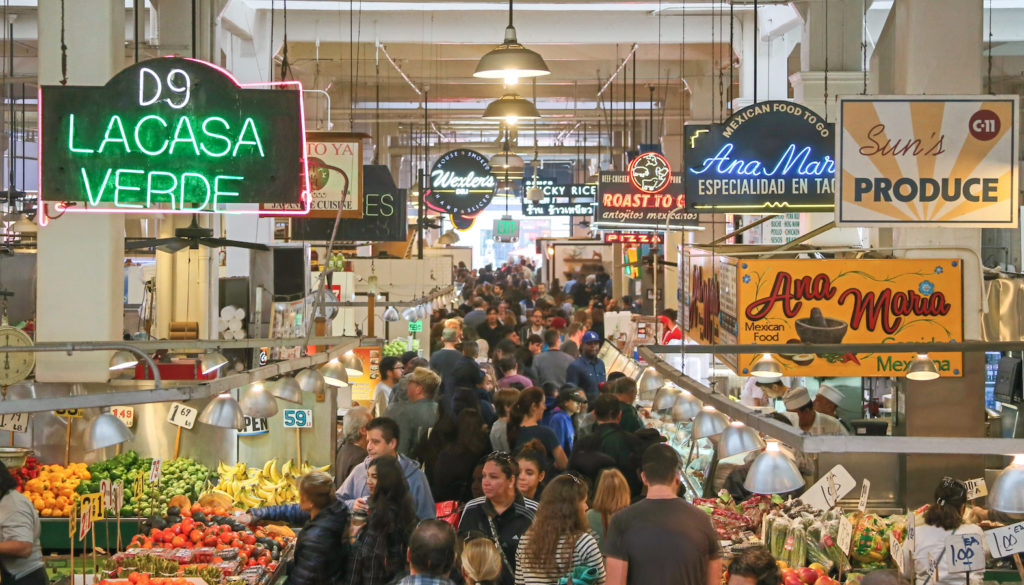Jonathan Gold (1960-2018) was LA’s Pulitzer Prize-winning restaurant critic.
Whether writing for “LA Weekly,” the “LA Times,” or “Gourmet,” he was way more than a food critic. He was a cultural treasure: erudite, articulate, eccentric, endlessly curious, warm.
A native Angeleno, for a while when he was in his early 20s, Gold famously “had only one clearly articulated ambition: to eat at least once at every restaurant on Pico Boulevard.”
Though he would eventually work his way up to, and write just as well about, rarefied Beverly Hills sushi palaces and 4-star Michelin Tuscan farmhouse feasts, his heart seemed always to remain with the street food, the ethnic, the off-the-beaten path mom-and-pop joints of his beloved LA: Salvadoran pupusas, Mexican tacos al pastor, Korean barbecue, Oki Dogs.
Two hundred of his columns are collected in “Counter Intelligence: Where to Eat in the Real Los Angeles” (LA Weekly Books, $15.59), named after the column he began writing for “LA Weekly” in 1986.
Here’s how he described an item from a strip-mall joint in Alhambra called the 101 Noodle Express: “But the beef roll — oh yes, the beef roll — a steroidal composition straight out of Shandong, of fried Chinese pancakes, cilantro and great fistfuls of thinly sliced meat wetted with sweet bean sauce and formed into Chinese burritos the size of softball bats.”
In the city of the $200 haircut, he wore his thinning strawberry-blond locks long and wispy. In the land of the svelte, he was gloriously corpulent.
The 2015 documentary “City of Gold” celebrates his life and work. “If I’m doing anything that’s beyond writing about food,” he said in one post-screening Q&A, “it’s to get people in Los Angeles to be a little less afraid of their neighbors.”
M.F.K. Fisher (1908-1992), raised in Whittier, was the much-celebrated author of 27 books, including such classics as “Consider the Oyster” (North Point Press, $13.98), “How to Cook a Wolf” (North Point Press, $16.09), and “The Art of Eating” (Harvest, $16.59).
She wrote gorgeous prose, was elected to the American Academy and National Institute of Arts and Letters, married three times, bore and raised two daughters, and lived the last 40 years of her life shuttling between all points California as well as Switzerland, Italy, and France.
Eating for Fisher was an art, a thought, a behavior that went way beyond food. She learned to cook in France, where she went with her first husband in 1929.
She returned to California and settled in Hemet with her second husband and the love of her life who, suffering from a rare circulatory disease, eventually committed suicide.
Her books are personal, strong-opinioned, and though I often disagree with her food preferences and ideas, endlessly compelling. They also contain recipes.
“Like most humans,” she once observed, “I am hungry. But there is more than that. It seems to me that our three basic needs, for food and security and love are so mixed and mingled and entwined that we cannot straightly think of one without the others. So it happens that when I write of hunger, I am really writing about love and the hunger for it, and warmth and the love of it and the hunger for it.”
Alice Waters (b. 1944), founder of the famed Berkeley restaurant Chez Panisse, was largely responsible for the farm-to-table movement, the practice of cooking with local fruits, vegetables, meat, fish, and dairy, and the elevation of California cuisine to world-class status.
“Coming to My Senses” (Clarkson Potter, $12.69), her 2017 memoir, tells of the events leading up to the restaurant’s 1971 opening night. The shoestring trips to Paris as a young adult, where Waters awakened to wine, cheese, bread, and fresh ingredients simply prepared.
The cooking for friends back in Berkeley, the “Alice’s Restaurant” column, the stint working retail at a cookware store and bookshop.
The combing of farmers’ markets, coops, and ethnic grocery stores for the best ingredients, the dream of opening “a little French bistro,” the “unorthodox, spontaneous” management style whereby she hired people not on the basis of their experience but on personality and idiosyncratic skill.
Hey, Alice was doing something right. The restaurant is still going strong (the cost of a meal is now $175 per person, excluding beverages, tax, and service). Her brand is now associated with “food activism.” And her recipe “Lindsey’s Chocolate Cake with Sicilian Saboyan” from the “Chez Panisse Café Cookbook” (HarperCollins, $27.75) is still the best cake recipe I know.
But before Alice Waters, there was Helen Evans Brown (1904-1964). An East Coast transplant, Evans lived for many years above the Rose Bowl in Pasadena with her husband and helpmeet Phil.
Her “West Coast Cookbook” (Knopf, $21.50) was lauded by James Beard, made her a nationwide authority on the West Coast food scene, and is packed with recipes that take into account the area’s wide-ranging history: early settlers from Spain and Mexico, the pioneers of the Oregon Territory, immigrants who arrived on the West Coast to pan for gold or build railroads.
An early champion of fresh, local produce, she introduced her readers to then-exotic ingredients like cilantro and garlic. The recipes are snapshots of an earlier time: cocktail hors d’oeuvres like Corn Crisps and Dates in Cream, Filbert Macaroons, Pickled Oysters, Eggs Foo Yung, Estofada.
California is of course well-represented: Los Angeles Lemon Pie, Shrimps Nob Hill, Ojai Dove Stew.
Evans was also an early promoter of California wines.
Long may our great California food writers live — and may ever more arise.

